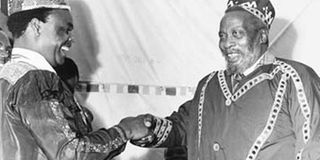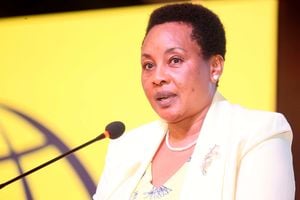Kenya at 52 and the ‘Shenginisation’ of our national language

Mulu Mutisya with Kenya's first President Mzee Jomo Kenyatta during national celebrations. I am thinking that we should, this Jamhuri, give Kenya a beautiful birthday present and it should be in Kiswahili. I suggest that we should all choose one day and make every effort to speak the best, most correct, sanifu, Kiswahili that we can command. After all, Kiswahili is our national language. PHOTO | FILE
What you need to know:
- Ndugu zanguni, Kenya can and should be the place where Kiswahili is most naturally and most beautifully spoken.
- As for Sheng, as a linguist, I truly and genuinely accept it as a linguistic reality in Kenyan society. But I am not a wholehearted enthusiast of it, like my young relative Wanjohi wa Makokha. In any case, I do not know enough about it to be able to make authoritative statements about it.
- Since Kenyans like doing things in a big way, we could make our Jamhuri present really big by making it a weekly Kiswahili day, say every Wednesday, throughout the year. That would be 52 full days of using our official and national language efficiently, fluently and proudly as we move confidently towards full cultural freedom.
By the time you read this, Kenya will be 52 years old, the parades will be plodding the grounds and the fly-past jets plying and cleaving the skies. The formal speeches will be rolled out in Oxbridge, followed by some informal remarks in Kiswahili, for the benefit of wananchi.
I was there in 1963 when uhuru – the freedom, not the man – came, and I vividly remember the ecstatic jubilation of the crowds. My most iconic memory of the occasion was the clutch of lyrics: “the cockerel has crowed/the day has dawned/the troubles are finished/Africa is ours”, intoned in sonorous Kiswahili by the top musicians of the time.
I am thinking that we should, this Jamhuri, give Kenya a beautiful birthday present and it should be in Kiswahili. I suggest that we should all choose one day and make every effort to speak the best, most correct, sanifu, Kiswahili that we can command. After all, Kiswahili is our national language.
The present should, preferably, be a Kiswahili-only day, with all business being transacted in Kiswahili, the other languages being used only where it is absolutely inevitable. Since Kenyans like doing things in a big way, we could make our Jamhuri present really big by making it a weekly Kiswahili day, say every Wednesday, throughout the year. That would be 52 full days of using our official and national language efficiently, fluently and proudly as we move confidently towards full cultural freedom.
A significant number of Kenyans speak Kiswahili as their mother tongue. A large number speak it as their primary language, that is, the main language in which they do most of their daily living. All literate Kenyans brought up in the last 30-odd years are presumed to have standard Kiswahili competence.
KISWAHILI BATTLE
This, as I have said before, is one of the richest fruits of the 8-4-4 education system. Making Kiswahili as an obligatory subject of study throughout our primary and secondary education was a tremendous step in the implementation of the liberation process that we celebrated in 1963. It was absurd to keep Kiswahili, our official and national language, as an optional subject of study.
The battle had not been easy. Kiswahili is native to Kenya. Kenya is, indeed, its cradle. Kiswahili was the language that united Kenyans in all their struggles, as emblematised in Mzee Kenyatta’s “ndugu zanguni” clarion call.
Nevertheless, the decades of enslavement and colonial brain washing took its toll. The victims of this, especially among the so-called “educated” elite, became thoroughly convinced that whatever came from the London, including English, was the “thing”, and everything else was savage, primitive, backward and shenzi.
This, for example, lay at the heart of those battles that I told you about over the introduction of Kiswahili into the Bunge. That Kiswahili won that battle, despite the loud and lively voices of the reactionary mighty and powerful of the times, is clear proof of its rootedness in the Kenyan heart and psyche.
But we should not be complacent. The battle for Kiswahili is very far from being entirely won. Our national language still faces many hurdles, among them slovenliness, Sheng and, again, the lingering colonial hangover.
Regarding the hangover, I recently went into my bank on Koinange Street, Nairobi, to enquire about some documents. At the Customer Service Desk I broke, quite spontaneously, into a fast-paced explanation of my requirements. Then I stopped suddenly.
I had noticed a truly pained expression on the face of the lady at the desk, even before she said quietly: “I’m sorry, I don’t think I get you.” Obviously this “not getting” me was not only about not understanding me. It was, sadly, and more distressingly about my linguistic “misbehaviour”.
I had addressed her in Kiswahili. How could an apparently educated gentleman dare discuss serious business, like banking, in Kiswahili? This language is for informal, jocular and private or marketplace use. You don’t talk to a bank official in “Swahili”. I will leave the reader to reflect and decide if this is not the prevalent attitude among most Kenyans, especially the so-called educated ones.
REGIONAL DIALECTS
Slovenliness, closely related to the above, regards the way most of us, including me, usually speak Kiswahili “anyway we like”, to quote Professor Higgins in My Fair Lady. Poor grammar (hii kitu), atrocious pronunciation, laden with every shade of regional linguistic influence and crudities of unacceptable dialectal distortions, like Kisetla (“jambo”), Kimisheni and the like — these seem to be the main characteristic of our Kiswahili.
While we cannot entirely rule out regional varieties and variations, in our day and age, no average Kenyan can claim unawareness of standard forms of Kiswahili. Absolving oneself of the duty and obligation to do one’s best to approximate that standard is either laziness or sheer lack of respect for one of the most conspicuous markers of our culture and identity.
Yet I find that trying to use Kiswahili sanifu, whether in speech or writing, is often taken as affectation or showiness (kuringisha) or a suggestion of foreignness (when are you getting back to – wherever). Ndugu zanguni, Kenya can and should be the place where Kiswahili is most naturally and most beautifully spoken.
As for Sheng, as a linguist, I truly and genuinely accept it as a linguistic reality in Kenyan society. But I am not a wholehearted enthusiast of it, like my young relative Wanjohi wa Makokha. In any case, I do not know enough about it to be able to make authoritative statements about it.
All I can wish is that we should realise that Kiswahili and Sheng probably exist among us as social registers. Intelligent users should know and observe the contexts in which Sheng may be acceptably used and the contexts in which our national language, Kiswahili Sanifu, must be used.
That would be a wonderful independence gift to Kenya. Tuitunukie Kenya, tafadhali (let’s give this present to Kenya).





